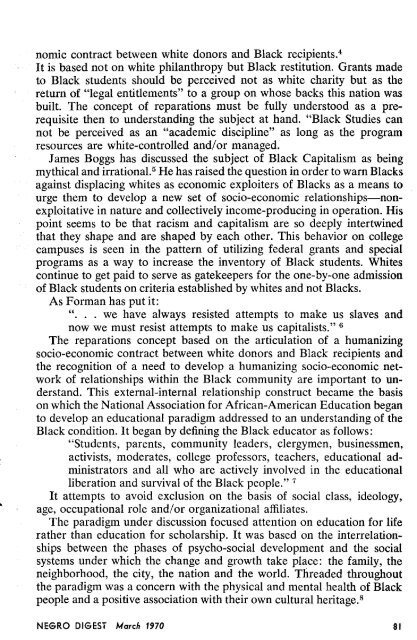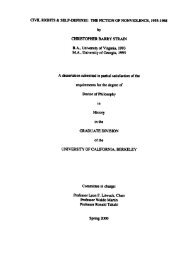- Page 1 and 2:
1YIARCH tliBB A JOtiNSaN rl7"LICATI
- Page 3 and 4:
CONTENTS The Blacli University The
- Page 5 and 6:
Kwame Nkrumah compares the colonial
- Page 7 and 8:
deficiency is not sa much a shortco
- Page 9 and 10:
are we here? We were sent here to l
- Page 11 and 12:
acial group with rites and loyaltie
- Page 13 and 14:
might well be that, to meet the nee
- Page 15 and 16:
A distinguished young educator from
- Page 17 and 18:
come to accept the judgment . Conse
- Page 19 and 20:
ditional knowledge required for the
- Page 21 and 22:
Faculty, Curriculum, Research . . .
- Page 23 and 24:
passive role and assumed that the e
- Page 25 and 26:
ante is formidable is obvious to an
- Page 27 and 28:
Social Change in the Sixties THE BL
- Page 29 and 30:
trends in the black community to sh
- Page 31 and 32:
ployment rate for black youth betwe
- Page 33 and 34:
For Our People - Everywhere "By far
- Page 35 and 36:
analogues for possible study . ) We
- Page 37 and 38:
World publication of the Caribbean,
- Page 39 and 40:
NEGRO DIGEST March 1968 39
- Page 41 and 42:
NEGRO DIGEST March 1968 4 1
- Page 43 and 44:
make Howard "sixty per cent white"
- Page 45 and 46:
Simultaneously there arose a hybrid
- Page 47 and 48:
NEGRO DIGEST March 1968 In the days
- Page 49 and 50:
A Call To Concerned Black Educators
- Page 51 and 52:
BOOK "Great Literature i.s simply l
- Page 53 and 54:
the members of Miss Brooks' worksho
- Page 55 and 56:
BY CHRISTINE REAMS ' . . . Ifo .sat
- Page 57 and 58:
as Mike and Jim dashed down the ste
- Page 59 and 60:
"Oh, my hair i~ so curly, so curly
- Page 61 and 62:
one of them a good whipping, no mat
- Page 63 and 64:
a while . I didn't know what she me
- Page 65 and 66:
Since sufficient teachers cannot be
- Page 67 and 68:
NEW PROGRAMS AND EXPERIMENTATION Th
- Page 69 and 70:
TRUSTEES If I seem indifferent to t
- Page 71 and 72:
years when '`Christian character an
- Page 73 and 74:
leaders and professors posing as mi
- Page 75 and 76:
out of "The Punch Out" and other st
- Page 77 and 78:
penniless writer, he travels the ga
- Page 79 and 80:
No doubt about it, Mr . Williams ca
- Page 81 and 82:
esearch crying for the kind of clar
- Page 83 and 84:
lightly as Western intellectual imp
- Page 85 and 86:
as a white man with a similar educa
- Page 87 and 88:
lacks are better off, but we must a
- Page 89 and 90:
income blacks and better for the mi
- Page 91 and 92:
compared to white men had not impro
- Page 93 and 94:
"iON ONYE LOCKARD is a selftaught a
- Page 95 and 96:
Plea ForA Second Chance : Work-worn
- Page 97 and 98:
That something is gravely wrong wit
- Page 99 and 100:
THE DUKE NATURAL SET MAlR SHEEN lea
- Page 101 and 102:
Edgar F . Beck Vincent Hard min E .
- Page 103 and 104:
C®i'y~'>~' i'tw'~'~ Editor's Notes
- Page 105 and 106:
An Open Letter to Black Students in
- Page 107 and 108:
mentarily bolstered (or our minds m
- Page 109 and 110:
plications of such attitudes as you
- Page 111 and 112:
7 . Have you given serious thought
- Page 113 and 114:
of white institutions that there si
- Page 115 and 116:
Platform and Program S HL "Today we
- Page 117 and 118:
ism, and we are becoming aware that
- Page 119 and 120:
New agencies for Black education (A
- Page 121 and 122:
ment of a plan to hire 200 Black pr
- Page 123 and 124:
people in their struggle toward a c
- Page 125 and 126:
else suggests that the group is bac
- Page 127 and 128:
e established far Black students th
- Page 129 and 130:
A Dual Responsibility The White Uni
- Page 131 and 132:
a situation in a different manner w
- Page 133 and 134:
Black Perspective A cU~TU~~L, ~~~I~
- Page 135 and 136:
life-style, yet they persist in the
- Page 137 and 138:
plex (a viable institution in that
- Page 139 and 140:
The Positiveness of Separation BL~C
- Page 141 and 142:
white students are, except that wha
- Page 143 and 144:
did) to thesis students who then gr
- Page 145 and 146:
Roach, Harold Cruse, Rhody Mc- Coy,
- Page 147 and 148:
conferees attempted to eject white
- Page 149 and 150:
~. iii1~i-i Black Life, White "Expe
- Page 151 and 152:
BOOKS Black Writing : this is u, th
- Page 153 and 154:
Grow old? Maan! I ain't never Gonna
- Page 155 and 156:
answering ; "Monday. That is if tha
- Page 157 and 158:
at a time when the ratio of Negro d
- Page 159 and 160:
A Special Experience xox .a~, xi .:
- Page 161 and 162:
to comment that I was a typical cre
- Page 163 and 164:
students said, "Didn't Malcolm prea
- Page 165 and 166:
What I did object to was the effort
- Page 167 and 168:
with American education, period. Ho
- Page 169 and 170:
President Emeritus, Morehouse Colle
- Page 171 and 172:
them, there just aren't enough blac
- Page 173 and 174:
I cannot see the sponsorship for su
- Page 175 and 176:
economic changes now occurring with
- Page 177 and 178:
aising a question regarding in exac
- Page 179 and 180:
to say that "yet an irreverent revi
- Page 181 and 182:
Fire ; steal it, borrow it or wait
- Page 183 and 184:
lures and yet, in a most interestin
- Page 185 and 186:
and what is the right procedure for
- Page 187 and 188:
mentioned earlier, the whole black
- Page 189 and 190:
(C) Consistency of Thought and Acti
- Page 191 and 192:
J. .JICLCfj ._Jd .L'~ .FU~~e ; one
- Page 193 and 194:
must carry a greater sexual burden
- Page 195 and 196:
C.~e~or 3 l /ot~e3-- (Continued fro
- Page 197 and 198:
and that prepares them to deal effe
- Page 199 and 200:
THE DUKE NATURAL S ET EASY COMB let
- Page 202 and 203:
BLACK HISTORY BLACK POWER U .S .A .
- Page 204 and 205:
~re~atorc~ ~o~e~- THE BLACK UNIVERS
- Page 206 and 207:
"1lTew Creation or Familiar Deatla"
- Page 208 and 209:
contradictions they entail . Furthe
- Page 210 and 211:
As northern universities continue t
- Page 212 and 213:
Response to Vincent Harding 12 BY R
- Page 214 and 215:
was then running for the state asse
- Page 216 and 217:
e done without some base of support
- Page 218 and 219:
amount of emphasis-both in Bro . Mo
- Page 220 and 221:
m~,irofir_- ~r- ir;r_ rr_~,~r; v;~~
- Page 222 and 223:
Institute of the Black World : Basi
- Page 224 and 225:
In Chicago, movement toward the Bla
- Page 226 and 227:
olled . At this time, over 400 stud
- Page 228 and 229:
stand and serve as a bulwark, or re
- Page 230 and 231: Educating For Liberation and Humani
- Page 232 and 233: travel to the moon a routine miracl
- Page 234 and 235: Step 2-A deliberate effort is made
- Page 236 and 237: curriculum and philosophy, is in a
- Page 238 and 239: 38 Charlie Cobb, one of the key org
- Page 240 and 241: Initial organizing efforts proved q
- Page 242 and 243: 1 . Independent African Civilizatio
- Page 244 and 245: fl Position Paper CENTER FOR BLACK
- Page 246 and 247: standards and values that commit ou
- Page 248 and 249: "Ah thought he could be grateful fo
- Page 250 and 251: Gray Ward . . . Historian Benjamin
- Page 252 and 253: liberation struggle against Europea
- Page 254 and 255: his reputation tramped in front of
- Page 256 and 257: "Naw, the cash draw wuz clean, but
- Page 258 and 259: screen out those professors, white
- Page 260 and 261: elative to other areas in Californi
- Page 262 and 263: power to purge when necessary . Qui
- Page 264 and 265: all of those persons who are not on
- Page 266 and 267: Broken down, here is how I see this
- Page 268 and 269: ,~ ~ ~z~srlvr~ ¢e° (Continued fro
- Page 270 and 271: tion. (This would not exempt the ex
- Page 272 and 273: ~omrrcurtiverdiEc~- (Continued from
- Page 274 and 275: Each community will select/elect a
- Page 276 and 277: ing the amount of ivory tower energ
- Page 278 and 279: Before this issue can be systematic
- Page 282 and 283: This paradigm was to provide the fo
- Page 284 and 285: lion statements and social studies
- Page 286 and 287: s Wilcox, Preston . The Black Unive
- Page 288 and 289: An Assessment ~la~k t~ ~~ ~ ~ i~ ~u
- Page 290 and 291: and compartmentalization . We canno
- Page 292 and 293: lishment. Drum and Spear Press is a
- Page 294 and 295: ~erepecEive~- On writers and writin
- Page 296 and 297: will make available $100 cash prize
- Page 298 and 299: But times and the world have change
- Page 300: Mod, Modish and Militant Keeling on
















